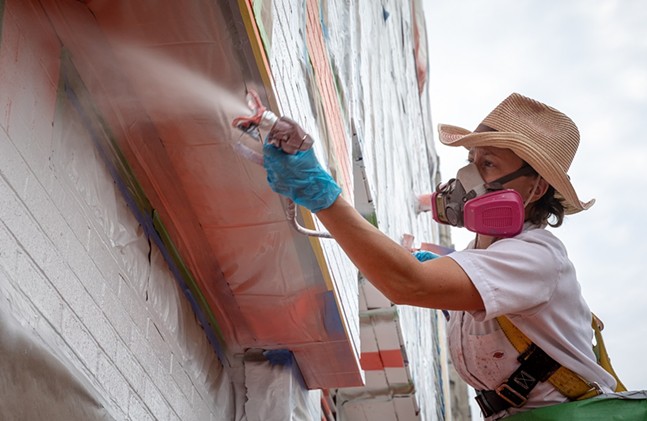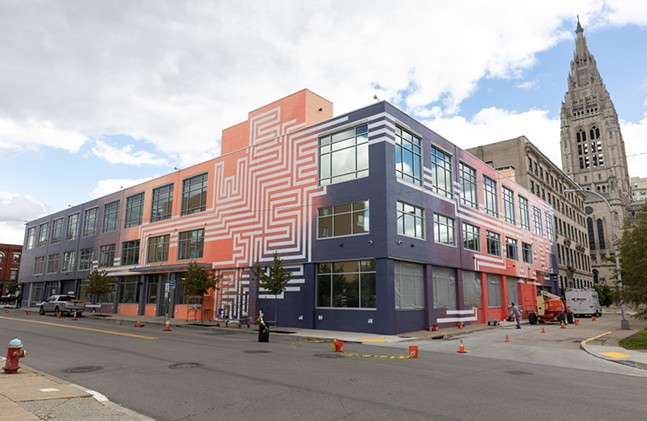Now, Duolingo, a Pittsburgh-based language-learning tech company, is hoping to correct this controversial move with a new public mural and $150,000 in grants focused on “creating public artwork in Pittsburgh and supporting local artists and arts organizations.”
Yesterday, Duolingo officially unveiled To Be Human, a new mural gracing its East Liberty offices. The work was executed by Detroit-based artist Ann Lewis, who, over the course of a residency, created it with students at the Barack Obama Academy of International Studies in East Liberty. A press release reads that the “mural’s colors and message are inspired by the student body’s ethos, creative collage making, and discussions centered on their perspective of community.”
“It is my honor to dedicate this mural to the students of Obama Academy and the Pittsburgh artists and activists that have engaged with me throughout this process,” says Lewis. “This wall has a complex history, and I am very grateful that the mural helped reestablish a dialogue between Duolingo and the community. Public art has the power to build bridges through creativity, birth conversations from silence, and generate positive change. I'm excited to see what comes next.”

Photo by Renee Rosensteel
Artist Ann Lewis works on her To Be Human mural at the Duolingo offices in Pittsburgh
“We wanted to find an artist who was familiar with working in a community-based process, not just someone coming in and creating a piece of art that doesn't take into account the context around it, and that is Ann's kind of specialty,” says Sam Dalsimer, head of PR at Duolingo. Dalsimer adds that, while they approved the final design, Duolingo had very little influence over the contents of the mural.
John Tronsor, Duolingo’s facility manager, adds that Lewis wanted to work with students at the Obama Academy as a way to “get a better sense of younger voices growing up in this neighborhood and seeing how they actually feel about what's occurring.”
Lewis' work with the students was documented in the short film We Rise Together by Chris Ivey, a local filmmaker who became one of the most vocal critics of the removal of Lend Me Your Ears. Ivey, who worked with Lewis through the mural's creation process, made We Rise Together as the first of a three-part series of films he's producing about Duolingo and its community arts programs.
In addition to the mural, the company has started distributing grants, the first of which went to artists Natiq Jalil, who contributed to Pittsburgh City Paper's Yinzerrific Coloring Book, and Alison Zapata, who originally helped install Lend Me Your Ears with its designer, Jordan Monahan. The remainder of the $150,000 will be given out over the next three years.
Tronsor says to expect an open-call for an arts grants application sometime in the early spring of next year.
“We're not looking for any particular type of practice,” says Tronsor, “but we want to make sure it's going to Pittsburgh artists and arts organizations.”
Dalsimer says the arts fund and mural are “definitely related” to the removal of Lend Me Your Ears. He believes that while Duolingo had no actual input in the mural's destruction, the company still felt the need to address it, adding that the company has been working with members of the community on how to best move forward.
“Some people have a perception that it was Duolingo's decision, but I think at a certain point through these conversations, we kind of realized or decided that it doesn't really matter anymore who took down that mural because Duolingo is still seen as the force that had taken over the building,” he says. “That sentiment motivated us to do something about this and to try and do something positive to move forward together with the community rather than continue to have this misunderstanding about that mural's history.”
To decide on the best artist for the job, he says they formed a selection committee that included Sallyann Kluz, director of the City of Pittsburgh's Office of Public Art, and Janera Solomon, the now-former executive director of Kelly Strayhorn Theater, the long-time East Liberty performing arts venue that has also served as a community hub and platform for Black talent.
Duolingo also awarded a sponsorship to Kelly Strayhorn to support its programming.
The mural and grants add to Duolingo's mission of becoming more embedded and involved with the Pittsburgh community. Dalsimer says that the company tries to ensure employees moving into Pittsburgh have “some understanding of the history and context of the neighborhoods they're moving into,” which includes connecting them with local organizations.
He says Duolingo also feels driven to create more pathways for people to enter the tech field. To achieve this, the company recently announced the launch of Thrive, a new internship program that provides job training to college sophomores belonging to groups that are underrepresented in tech.
While the Duolingo grant program has just begun, current Kelly Strayhorn Theater executive director Joseph Hall believes the company's support, as well as any discussion about the importance of the local arts scene, is critical at this time.
"Support for Pittsburgh artists and arts organizations connects our city to the world, expressing our values and most urgent priorities,” says Hall. “Since March, we’ve seen the escalation of art in the streets as part of movements for justice, on balconies showing solidarity through the pandemic, and on our screens which have reshaped the 21st-century stage. Community arts funding reinforces what we know to be true — art has the power to shape society."


